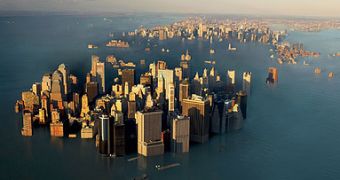A new research, whose findings were published in the scientific journal Nature Climate Chance only a few days back, says that stalling the predicted increase in global sea levels is very much within reach.
Thus, all that needs be done is cut down on the emissions of certain pollutants human society releases into the atmosphere on a regular basis.
The four harmful compounds targeted by this research are known to the scientific community as short-lived pollutants. Unlike other pollutants, short-lived ones tend to cycle at a fairly rapid pace through the atmosphere.
More precisely, they linger in the atmosphere for anywhere from a week to a decade. On the other hand, carbon dioxide is known to only begin to fade away after about one century.
Following their looking into how methane, soot, refrigerants, and gases that lead to the formation of ground-level ozone impact on climate patterns worldwide, the researchers who pieced together this study reached the conclusion that cutting down on the emissions of such compounds could result in the annual rate of sea level rise being reduced by 25-42% by 2100.
According to these specialists, the technologies human society currently has at its disposal allow it to tackle said short-lived pollutants.
Once these compounds experience a 30-60% decrease in their atmospheric concentrations, coastal communities will run fewer risks of being flooded as a result of increasing sea levels. Newswise quotes Aixue Hu, a specialist currently working with the US National Center for Atmospheric Research, who wished to make the following observations:
“To avoid potentially dangerous sea level rise, we could cut emissions of short-lived pollutants even if we cannot immediately cut carbon dioxide emissions. This new research shows that society can significantly reduce the threat to coastal cities if it moves quickly on a handful of pollutants.”
Backing up these statements, scientists Warren Washington pointed out the fact that, “It must be remembered that carbon dioxide is still the most important factor in sea level rise over the long term. But we can make a real difference in the next several decades by reducing other emissions.”

 14 DAY TRIAL //
14 DAY TRIAL //